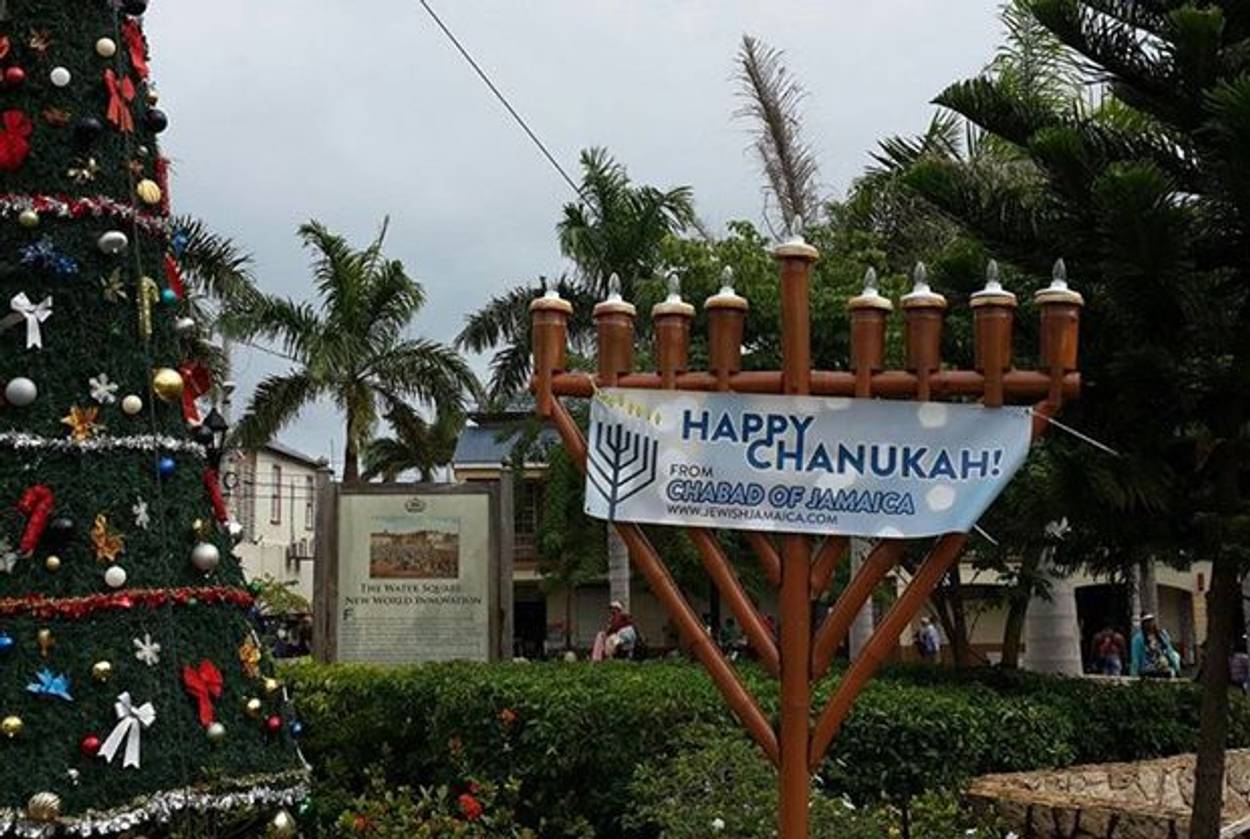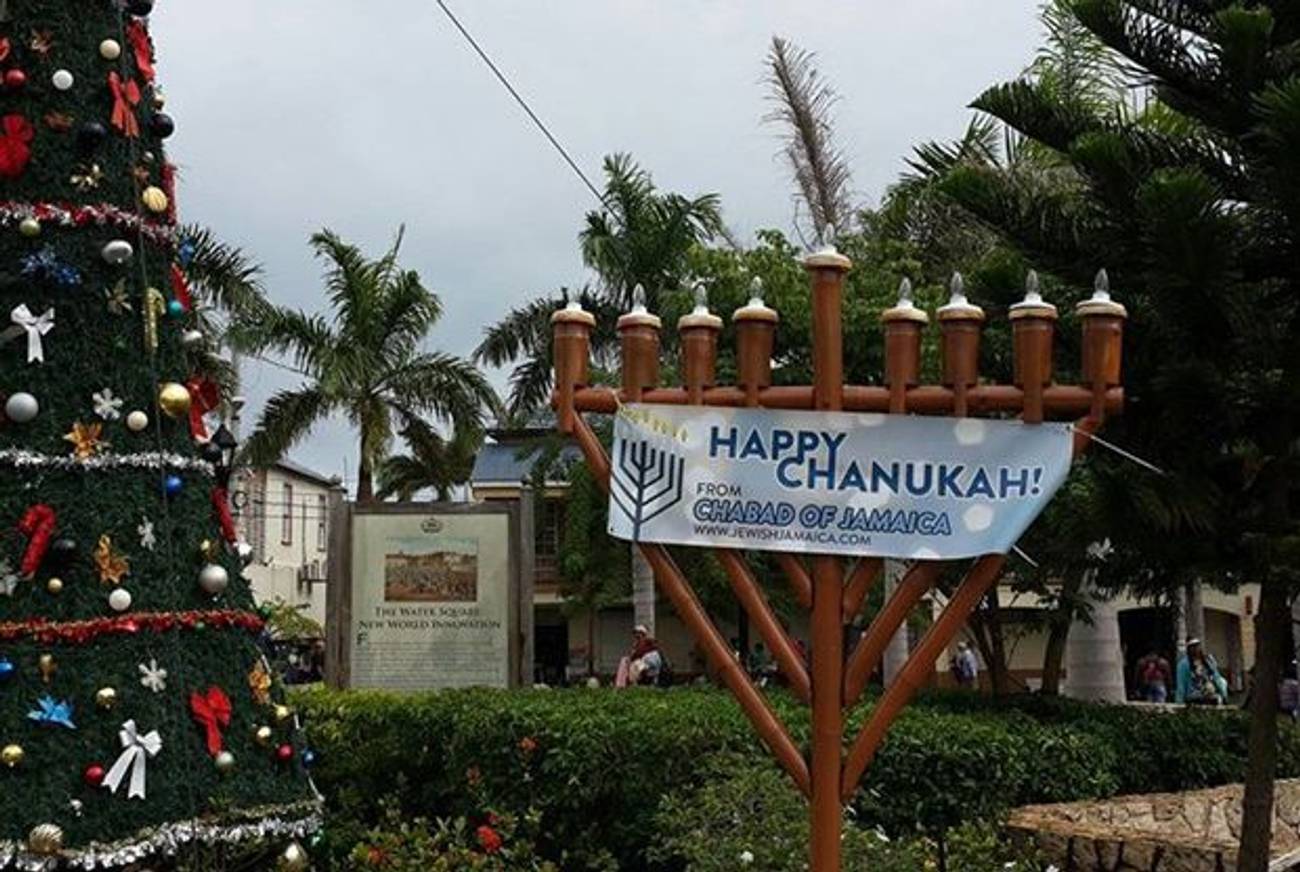Hanukkah in Jamaica
Holiday celebrations bring together the island’s diverse Jewish community




“Chabad of Jamaica,” Rabbi Yaakov Raskin declares when he answers his phone, and I think I detect a note of bemused triumph in his voice. Yes, there’s a Chabad house in Jamaica—not exactly a place you would expect to find Orthodox Jews. It opened in July 2014 in Montego Bay, right by the main hotel strip; the latest development in Jamaica’s long, fascinating, and diverse Jewish history. Jews have resided on the island since the time of the Spanish Inquisition—longer than almost any other community in the Americas or the Caribbean. From a peak of 2,500 in the late 1800s, there are now just 250 Jews (or thereabouts) in Jamaica, but their presence and influence in public life is certainly felt—and appreciated—by the wider population, many of whom express a strong connection to the Hebrew bible and Jewish culture.
So, how did Raskin, who is from Montreal, end up in Jamaica? Through a combination of keen scouting, and, as he told me over the phone last week, “divine providence.” In 2012, he visited the Caribbean islands with a friend and “developed a feeling for these small Jewish communities.” The following year he married Mushkee, a Brooklyn native, and together the couple began looking for a location to conduct shlichut—religious outreach directed towards Jews—which is one of the main undertakings of the Chabad movement. In March 2014 they visited Jamaica and met with about 30 local Jewish families. It was a “very warm visit,” says Raskin, but he was finally persuaded that it was the right move when he learned that his grandfather, Leibel Raskin, had been sent to the island in 1957 by Rabbi Menachem M. Schneerson, the Lubavitcher Rebbe.
I visited Jamaica this past summer, right before the official opening of the Chabad house, and met with members of the Jewish community in the capital of Kingston, which is located on the opposite side of the island from Montego Bay. Services are held every Shabbat at Shaare Shalom, a gracious, sand-floored synagogue just outside the downtown area, and attended by a small but dedicated coterie of congregants. I wondered how the established community would respond to the arrival of the Raskins, who bring a welcoming but distinctly more Orthodox flavor of Judaism to the country.
The rabbi of Shaare Shalom, Dana Evan Kaplan—who previously led a Reform congregation in Georgia—was circumspect about the possibility of the two rabbis officially working together. Chabad and Reform Judaism, he pointed out, don’t exactly go hand-in-hand—even on a tropical island. But despite their theological differences, Rabbi Kaplan was enthusiastic about the arrival of the Raskins, who he described as “the nicest, most genuine, most sincere people. We get along very well and I have deep respect for him and her.” Over the phone last week, he told me “a little shaking up” and competition would be a good thing for the established community.
Jamaica’s Hanukkah celebrations offer a microcosm of this evolving dynamic. On Sunday afternoon, Chabad hosted “Chanukah in the Sand,” a party for the community at the Bamboo Beach Club in Ocho Rios, which is a 90 minute drive from Kingston. About 50 people attended, partaking in a meal of Jamaican jerk chicken (the hotel’s kitchen was kashered for the occasion). Kids played in the water, and an 8-foot-tall, custom-designed bamboo hanukkiah was lit. In the crowd were Ainsley Henriques and Margaret Adam, two stalwarts of the Jamaican Jewish community who made the journey from Kingston with several others. Henriques, a jovial 76-year-old who has held various leadership roles in the community, was enthusiastic about the party, which attracted a mix of locals, tourists, and expatriate Jewish-Jamaicans (including his brother, who was visiting from abroad with 15 family members). When I asked him how he felt about the arrival of Chabad, he said, “For us it’s not a competition, they’re providing services which we don’t provide, they’re providing kosher meals for tourists… If they’re putting on a program, there’s no reason I shouldn’t attend.”
Adam, who teaches at Hillel Academy, a private school in Kingston founded by the Jewish community in 1969, was admiring of the Raskins, but careful in her choice of words and her framing of the community’s challenges.“I really do enjoy the energy of the Rabbi Raskin and Mushkee, and anything that brings more [Judaism] to the island is enriching,” she said, but at the same time, “we can’t compete with Chabad, and I do wonder about the future of our community.” Adam, who has served on Shaare Shalom’s board for the past three years, helped to organize the Hanukkah festivities in Kingston. There was a kids’ party on the first night at the home of one of the congregants, a Shabbat Hanukkah service at the synagogue on Friday (latkes, sufganiyot, and pizza were served), and a combined Carol/Hanukkah song hour at Hillel Academy on December 11, which coincided with the end of the term. (Hillel is non-denominational, but students learn about the school’s Jewish history.)
The Raskins travel regularly to various towns across the island and hold Torah classes in Kingston every two weeks. “When we go to Kingston, we try to do programs with the children there,” said Rabbi Raskin, who co-ordinates with Margaret Adam. “Our slogan is ‘Serving the Jewish tourists and locals from A-Z.’” In Jamaica, this means everything from providing kosher meals to visitors, to teaching Torah, to helping Jewish travelers in emergencies. (When a tourist died suddenly on Shabbat a few weeks ago, they assisted in repatriating his body back to New York.) “We’re here to bring light, to clarify what Judaism is to all those who would like to follow or learn without any pressure,” he told me right before Hanukkah. “We are here until the last Jew is on the island.”
Elissa Goldstein is Tablet’s director of audience development. She also produces Unorthodox. Follow her on Twitter here.